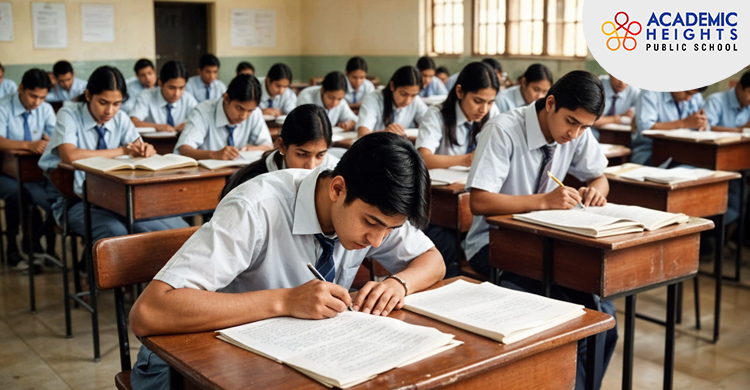Parents often feel confused about the CBSE vs ICSE Board and which one is better for their child. Choosing the right school and board for your child is crucial. This decision is one of the most important in their academic journey. It can significantly influence their career and future opportunities. India recognises two famous boards for senior and senior secondary education: CBSE and ICSE. Both boards provide high-quality education and cater to different educational needs and students. So, this blog is a complete guide for making a well-informed decision about CBSE vs ICSE Board. It will help you determine which is better for your child.
Overview of CBSE Board
CBSE Stands for the central board of secondary education. CBSE affiliates many government and private schools in India. So the government of India controls and manages CBSE, making it a national-level education board. Currently, there are more than 28,486 CBSE schools in India. CBSE was established in 1929 and aimed to experiment with inter-state integration in secondary education. CBSE-affiliated schools follow the NCERT curriculum, especially from 9th-12th standards.
Overview of the ICSE Board
ICSE stands for Indian Certificate of Secondary Education. Firstly the Council for the Indian School Certificate Examination conducts the examination. ICSE is a private board, It conducts examinations for secondary standards as per the New Education Policy 2020. The ICSE follows a grading system that is more in alignment with the foreign education system. ICSE is well-known for its extensive focus on language, arts, commerce, and science. The education mode at ICSE is English. Furthermore, this leads to ICSE students having a great command over language and communication skills.
Differences between CBSE vs ICSE Board

When you are thinking of CBSE vs ICSE Board, which is better for the Future? The answer to this question is that both CBSE and ICSE offer benefits suitable for students. The best choice depends on their preferences, personal goals, and availability. When making a well-informed decision between the CBSE vs ICSE board, consider the following pointers:
Which Board is Better – CBSE or ICSE Board?

When confused between the CBSE vs ICSE boards for your child, you should consider all the above-given information about both boards. Both CBSE and ICSE boards offer a wide variety of advantages to their students at the same time they have their demerits as well. When parents choose the right school for their child, they can easily navigate through the disadvantages of the boards at the same time, maximising their child’s potential.
CBSE vs ICSE Board – Network and Affiliation Comparison
CBSE has a wider network range with over 28,486 schools. It is available in both major cities and rural areas. ICSE has a smaller network in comparison to CBSE and currently, there are around 2300 ICSE schools across India. Famous school chains in India, such as Kendriya Vidyalayas and Jawahar Navodaya Vidyalayas. This includes major private school chains and government-approved schools, affiliated with CBSE.
The private schools in urban cities offer ICSE-based education. This is due to its high academic standards and main focus on the English language. CBSE-affiliated schools are widespread and easily accessible. If a student’s parents work in fields that require constant transfers, the CBSE board is the right choice. CBSE Board schools across the country maintain the same books and syllabus, making them widely accessible in various locations.
CBSE vs ICSE Board – Pedagogy and Syllabus Comparison
NCERT designs a highly structured and controlled curriculum for CBSE, primarily focusing on mathematics and science. CBSE offers the appropriate curriculum for the students who wish to sit for Indian government exams. This includes CUET, NEET, JEE and other competitive exams. ICSE offers a broader curriculum where the main focus is on proficiency in the English language. It also emphasizes the development of analytical skills. The ICSE curriculum is more in alignment with the international education standards.
Across the country, the syllabus of CBSE remains the same to promote uniformity in the secondary education sector. ICSE has a very comprehensive syllabus which covers a wide range of subjects where all the subjects hold equal importance. The ICSE curriculum is renowned for its rigorous English language training. It is often regarded as superior to that of other Indian boards. The comprehensive syllabus of the ICSE curriculum sometimes makes it appear more challenging compared to CBSE.
CBSE vs ICSE Board – Examination and Evaluation Comparison
CBSE board conducts two examinations every year. These are the AISSE(All India Secondary School Examination) for 10th standard. AISSCE refers All India Senior School Certificate Examination for 12th standard. CBSE exams are straightforward. The questions focus on the direct application of concepts. CBSE prepares standardized question papers to assess students’ understanding of fundamental concepts and their ability to apply those concepts in various contexts. CBSE has recently shifted its focus towards questions to test the competency of the students in various subjects. The evaluation in CBSE is very direct, where the main objective is to evaluate direct answers with less focus on deep analysis.
ICSE examinations for 10th and 12th standard are more comprehensive and rigorous in nature. The structure of ICSE exams evaluates students’ in-depth knowledge of specific subjects and emphasizes their ability to express that knowledge clearly and concisely. ICSE’s criteria for evaluating the examinations are stricter, where the key focus is on delivering the answers with a thorough explanation and a good command of language.
CBSE vs ICSE Board – Difficulty Comparison
People consider the CBSE curriculum easier compared to the ICSE curriculum. In CBSE the main focus is on science and mathematics. The questions asked in CBSE exams are straightforward and direct in nature. If a student has a moderately satisfactory understanding of the concepts, he or she can score good marks in their CBSE board exams.
As the curriculum of ICSE is vast, it is difficult as well in comparison to CBSE. ICSE board has various subjects in their curriculum and a student of ICSE board needs to develop a deep understanding of their subjects to score well in their exams. In the ICSE board, the focus is not only on the answers but also on the way a student presents them. Every examination in the ICSE board is not just testing student’s knowledge of a particular subject but also their command over language and their ability to present well-structured answers.
CBSE vs ICSE Board – Scholarship Comparison
CBSE is an education board. It is affiliated with the Indian government. CBSE board does offer various scholarships to their talented students. CBSE conducts several examinations, with the goal of finding exceptionally talented students and a willingness to fund them to maximize their potential. This approach of the CBSE board makes it the best option for those students who belong to economically weaker sections. The ICSE board does not offer any such scholarship programmes to their students, hence it becomes less accessible for students who are from weaker financial sections.
Advantages of CBSE Board
Many recognize CBSE as one of the most prominent education boards in India, making it easily accessible across the country, whether in rural areas or urban cities. The curriculum of CBSE prepares the students for Indian competitive examinations like JEE and NEET. The CBSE designs its curriculum to emphasize subjects like mathematics and science, which reduces the burden on students to study and understand multiple subjects at once. CBSE-based schools offer education at a more affordable price, suitable for all sections of society.
Disadvantages of the CBSE Board
CBSE curriculum is less detailed and comprehensive in comparison to the ICSE board, with less emphasis on subjects like language and arts. CBSE offers less exposure to other languages and only focuses on Hindi and English. Some critics argue that CBSE’s focus on uniformity and standardisation may hinder creativity and critical thinking skills in the students
Advantages of ICSE Board
The ICSE board curriculum is holistic in nature as it focuses on maintaining a balance between the studies of arts, language and science. ICSE’s curriculum also encourages the students to have a deeper understanding of the concepts they are studying, increases their creativity and develops analytical skills. The ICSE board suits students aiming for higher studies abroad because it tailors its curriculum to prepare them for international education systems. The medium of education at the ICSE board is English, which further helps in developing English communication skills at an early age, a necessary skill for a globalised world.
Disadvantages of the ICSE Board
Many consider the ICSE board’s curriculum rigid and demanding, which might hinder students from developing their interests outside of academics. As ICSE offers a broad curriculum, that also increases the workload on the students, which might cause stress and burnout in the students. Some critics say that the ICSE curriculum is based on a global perspective and might not include the cultural and regional contexts that are important for students in India.
The evaluation system of the ICSE board is rigid which includes a lot of assignments, tests and examinations based on detailed knowledge of various subjects. ICSE’s intense evaluation style might not be suitable for every student out there. The limited availability of ICSE-based schools compared to CBSE schools might concern students whose parents frequently transfer to different locations.
Conclusion
When confused between ICSE vs CBSE board, always consider your child’s unique needs, future goals, and location availability to make a well-balanced decision. Compare the network and affiliation, pedagogy and syllabus, examination and evaluation, difficulty level, scholarship provision, advantages and disadvantages of both boards before enrolling your child in the school.
